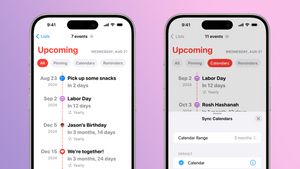JAKARTA - Global cybersecurity firm Kaspersky has monitored a 60 percent increase in the number of malicious mobile banking trojan attacks detected and blocked in the Southeast Asia region, in Q2 2021.
Mobile banking or banker Trojans are used by cybercriminals to steal funds directly from mobile banking accounts. These malicious programs usually look like legitimate financial applications, but when victims enter credentials to gain access to their bank accounts, attackers then gain access to that personal information.
Overall, since the start of 2021, Kaspersky has foiled a total of 708 incidents in six countries in Southeast Asia. This is 50 percent of the total number of mobile banking trojans blocked in 2020 as many as 1,408.
Indonesia and Vietnam recorded the highest number of incidents during the first half of this year. However, globally, the two countries are not included in the top 10 countries affected by this threat. Vietnam is ranked 27th while Indonesia is ranked 31st in June this year.
The five countries with the highest number of mobile banking Trojan detections in Q2 2021 are Russia, Japan, Turkey, Germany and France.
While the number of mobile banking Trojan attacks in Southeast Asia is still low, from April to June this year, Kaspersky detected more than the same period last year, which was 367 versus 230. This shows the ongoing pandemic continues to force users to start using mobile payment systems, and cashless is becoming more common.
“Since the beginning of this health crisis, our survey shows that the majority of internet users in the region have shifted their financial activities online, such as shopping (64 percent) and banking (47 percent),” said Yeo Siang, General Manager for Southeast Asia at Kaspersky. Chinese.
In addition, another Kaspersky report entitled “Making Sense of Our Place in the Digital Reputation Economy” revealed that a majority (76 percent) of 861 respondents from Southeast Asia made up their minds not to store financial-related data on the internet. The highest sentiment was among Baby Boomers. (85 percent), followed by Gen X (81 percent), and Millennials (75 percent).
“The good news is that people in this region still have a fairly good awareness of the security risks of banking transactions and payments via mobile phones/personal devices. But unfortunately there is still a gap between knowledge and action," said Yeo.
That's why Kaspersky shares tips on keeping your financial security safe online, Tuesday, September 7th.
Have a Temporary Credit CardCybercriminals have developed techniques and malware so sophisticated that they can sometimes thwart your best efforts to shop safely online.
To implement another measure, you can use a temporary credit card to make online purchases, instead of the main credit card. Check with your credit card company if it's possible to get a temporary credit card number.
However, if possible avoid using this type of credit card for any purchases that require automatic renewal or regular payments. If a credit card is temporarily not possible, the alternative is to use a credit card with a low credit limit.
Dedicating Computers to Online Banking and ShoppingIf you have more than one computer, maybe it can be used to do online banking and shopping. By avoiding using your computer for other Internet browsing, downloading files, checking email, social networking, and other online activities, you effectively keep your computer 'clean' and free of computer viruses and other infections.
For added security in safe online shopping, install Google Chrome, with HTTPS. This ensures you to only visit safe websites.
These are 5 Tips for Maintaining Financial Security Online
JAKARTA - Global cybersecurity firm Kaspersky has monitored a 60 percent increase in the number of malicious mobile banking trojan attacks detected and blocked in the Southeast Asia region, in Q2 2021.
Mobile banking or banker Trojans are used by cybercriminals to steal funds directly from mobile banking accounts. These malicious programs usually look like legitimate financial applications, but when victims enter credentials to gain access to their bank accounts, attackers then gain access to that personal information.
Overall, since the start of 2021, Kaspersky has foiled a total of 708 incidents in six countries in Southeast Asia. This is 50 percent of the total number of mobile banking trojans blocked in 2020 as many as 1,408.
Indonesia and Vietnam recorded the highest number of incidents during the first half of this year. However, globally, the two countries are not included in the top 10 countries affected by this threat. Vietnam is ranked 27th while Indonesia is ranked 31st in June this year.
The five countries with the highest number of mobile banking Trojan detections in Q2 2021 are Russia, Japan, Turkey, Germany and France.
While the number of mobile banking Trojan attacks in Southeast Asia is still low, from April to June this year, Kaspersky detected more than the same period last year, which was 367 versus 230. This shows the ongoing pandemic continues to force users to start using mobile payment systems, and cashless is becoming more common.
“Since the beginning of this health crisis, our survey shows that the majority of internet users in the region have shifted their financial activities online, such as shopping (64 percent) and banking (47 percent),” said Yeo Siang, General Manager for Southeast Asia at Kaspersky. Chinese.
In addition, another Kaspersky report entitled “Making Sense of Our Place in the Digital Reputation Economy” revealed that a majority (76 percent) of 861 respondents from Southeast Asia made up their mind not to store financial-related data on the internet. The highest sentiment was among Baby Boomers. (85 percent), followed by Gen X (81 percent), and Millennials (75 percent).
“The good news is that people in this region still have a fairly good awareness of the security risks of banking transactions and payments via mobile phones/personal devices. But unfortunately there is still a gap between knowledge and action," said Yeo.
That's why Kaspersky shares tips on keeping your financial security safe online, Tuesday, September 7th.
Have a Temporary Credit CardCybercriminals have developed techniques and malware so sophisticated that they can sometimes thwart your best efforts to shop safely online.
To implement another measure, you can use a temporary credit card to make online purchases, instead of the main credit card. Check with your credit card company if it's possible to get a temporary credit card number.
However, if possible avoid using this type of credit card for any purchases that require automatic renewal or regular payments. If a credit card is temporarily not possible, the alternative is to use a credit card with a low credit limit.
Dedicating Computers to Online Banking and ShoppingIf you have more than one computer, maybe it can be used to do online banking and shopping. By avoiding using your computer for other Internet browsing, downloading files, checking email, social networking, and other online activities, you effectively keep your computer 'clean' and free of computer viruses and other infections.
For added security in safe online shopping, install Google Chrome, with HTTPS. This ensures you to only visit safe websites.
Use a Dedicated E-mail AddressCreate an email address that you will only use for online shopping transactions. This will greatly limit the number of spam messages you receive and significantly reduce your risk of exposure to malicious emails disguised as sales pitches or other notifications.
Manage and Protect Your Online PasswordsUsing strong, different passwords for each online account is one of the most important things you can do for safe online shopping. We understand it can be difficult to remember so many different passwords, especially if they consist of a lot of letters, numbers and special characters.
Use VPNIf you absolutely must shop online while on public Wi-Fi, first install a VPN (virtual private network) solution. A VPN will encrypt all data transferred between your computer or mobile device and the VPN server can prevent hackers from hijacking and viewing any sensitive data you enter.
Use a Dedicated E-mail AddressCreate an email address that you will only use for online shopping transactions. This will greatly limit the number of spam messages you receive and significantly reduce your risk of exposure to malicious emails disguised as sales pitches or other notifications.
Manage and Protect Your Online PasswordsUsing strong, different passwords for each online account is one of the most important things you can do for safe online shopping. We understand it can be difficult to remember so many different passwords, especially if they consist of a lot of letters, numbers and special characters.
Use VPNIf you absolutely must shop online while on public Wi-Fi, first install a VPN (virtual private network) solution. A VPN will encrypt all data transferred between your computer or mobile device and the VPN server can prevent hackers from hijacking and viewing any sensitive data you enter.
The English, Chinese, Japanese, Arabic, and French versions are automatically generated by the AI. So there may still be inaccuracies in translating, please always see Indonesian as our main language. (system supported by DigitalSiber.id)








